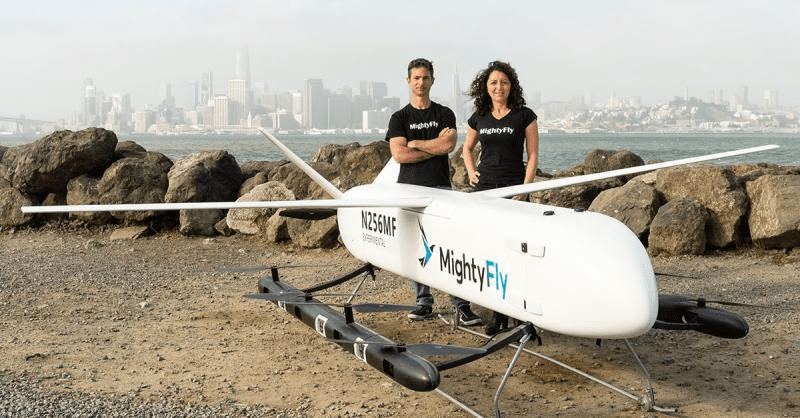
MightyFly’s MF-100 is a hybrid-electric vertical take-off and landing (eVTOL) aircraft with a payload of 100 pounds, cruising speed of 150 mph, and range of 600 miles. (MightyFly)
The use of drones for logistics or delivery services is often imagined as a solution for last-mile deliveries of small packages or food. MightyFly is looking to occupy a different segment of the market with a large cargo drone that could be used in business-to-business logistics instead of business to customers.
Manal Habib and Scott Parker, the two co-founders of MightyFly, met while working at another drone logistics company, Zipline, where they realized they wanted to create a drone logistics company that catered to larger cargo.
“Expedited delivery is supposed to be faster and cheaper and it is very hard to meet that given our current tools which are trucks or larger aircraft,” Habib told reporters in a call on April 22. “The issue is when they’re small deliveries, you cannot fill them up, and when those vans, trucks, and larger planes are not filled up, the price of those expedited deliveries becomes expensive. So, what we’re building is an agile platform that meets that need and that is going to be able to provide expedited deliveries that are both faster and cheaper and carbon neutral.”
MightyFly’s MF-100 is a hybrid-electric vertical take-off and landing (eVTOL) aircraft with a payload of 100 pounds, cruising speed of 150 mph, and range of 600 miles, Habib said. They will also develop a second model with a 500-pound payload.
“The aircraft we’re building is an autonomous cargo aircraft that could carry that 100 pounds or 500 pounds, depending on which fleet we’re talking about, and each one of these aircraft will have a range of 600 miles, and a speed up 150 miles per hours,” Habib said. “These aircraft are going to have a hybrid propulsion system, which is pretty unique and enables us to have two modes one electric and one powered with our gas…On top of that, this technology is going to be carbon neutral which gives us a huge advantage on how to transform our logistics industry.”
Habib said the decision to go with a hybrid propulsion system that uses batteries and gas was based on the need for efficiency. By using both energy sources, the aircraft will always have a backup system in case of failure.
“We decided that we need energy that is more efficient, so we needed to bring in gas because it is still way more efficient than the batteries that we have currently in the system,” Habib said. “Having this hybrid propulsion system gives us the ability to have two backup propulsion systems so if there is a problem with one of the systems, we simply switch to the other. So, we pretty much have two systems that are capable of flying these aircraft, and it gives us a huge advantage in terms of safety.”
The MF-100 will use the electric system for take-off and landing and the hybrid system for forward flight, Habib said. The hybrid system also charges the batteries during the flight which eliminates the need for multiple charging stations and downtime between flights.
“We are using whatever the best batteries are available out there to give us the maximum energy efficiency that we can get,” Habib said. “One very unique thing about our design is that our hybrid engine can charge the batteries in flight, which means that we do not need any charging stations in the ground.”
The MF-100 will also be able to make multiple deliveries during one flight, Habib said.
MightyFly started by building a small prototype of the MF-100 to develop software and autonomy for the aircraft, Habib said. This was a proof-of-concept design that started making autonomous deliveries about a year ago.
The full-scale MF-100 prototype has completed tests doing autonomous hover and will move on to the forward flight transition tests in the next six months, Habib said.
MightyFly was recently awarded a Special Airworthiness Certificate from the Federal Aviation Administration (FAA) for test flights. The MF-100 will be certified under FAA Part 135 certification.
“We have gotten our special awareness certification which enables us to fly in the U.S. in specific areas,” Habib said. “The plan is to perform a proof-of-concept delivery service, where we’re showcasing the whole case end to end from meeting our customers’ demand into showcasing the service to showcasing the autonomy. After that, we are going to go for applying for a Part 135 certification, which is needed to go ahead and provide a full commercial delivery service in the U.S. So, we see that it’s going to be about a three-year timeline for us to get all the way there.”